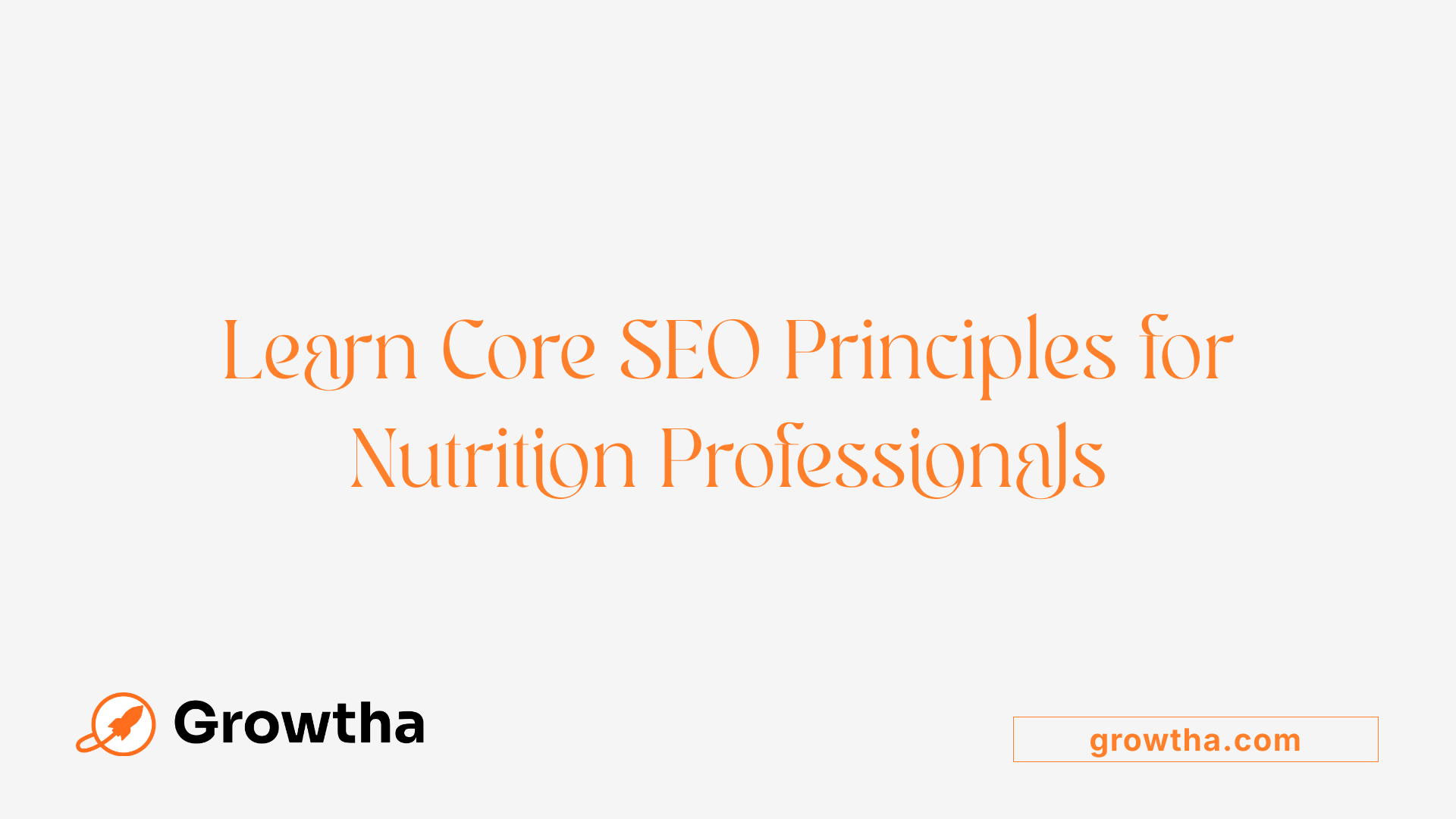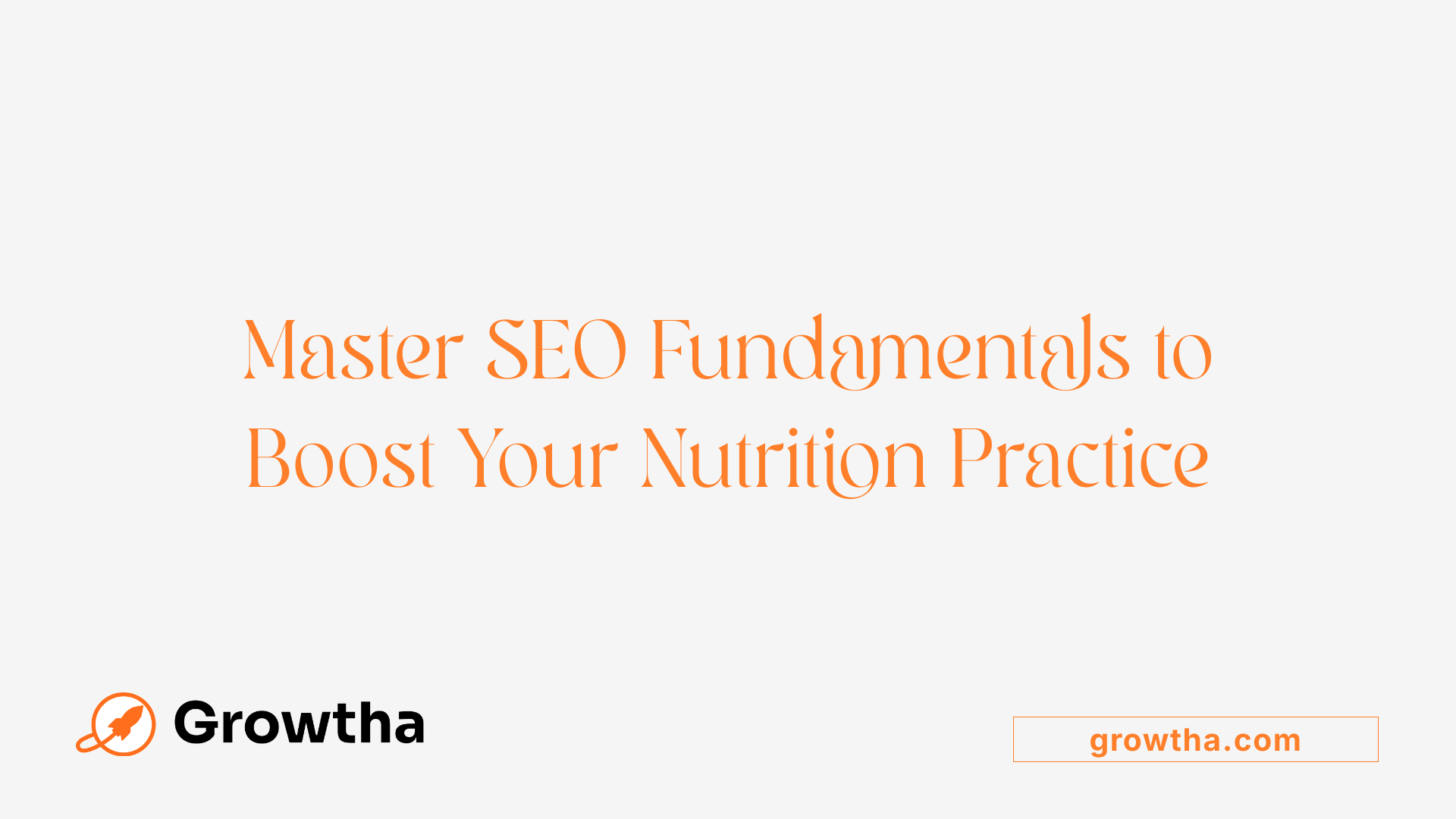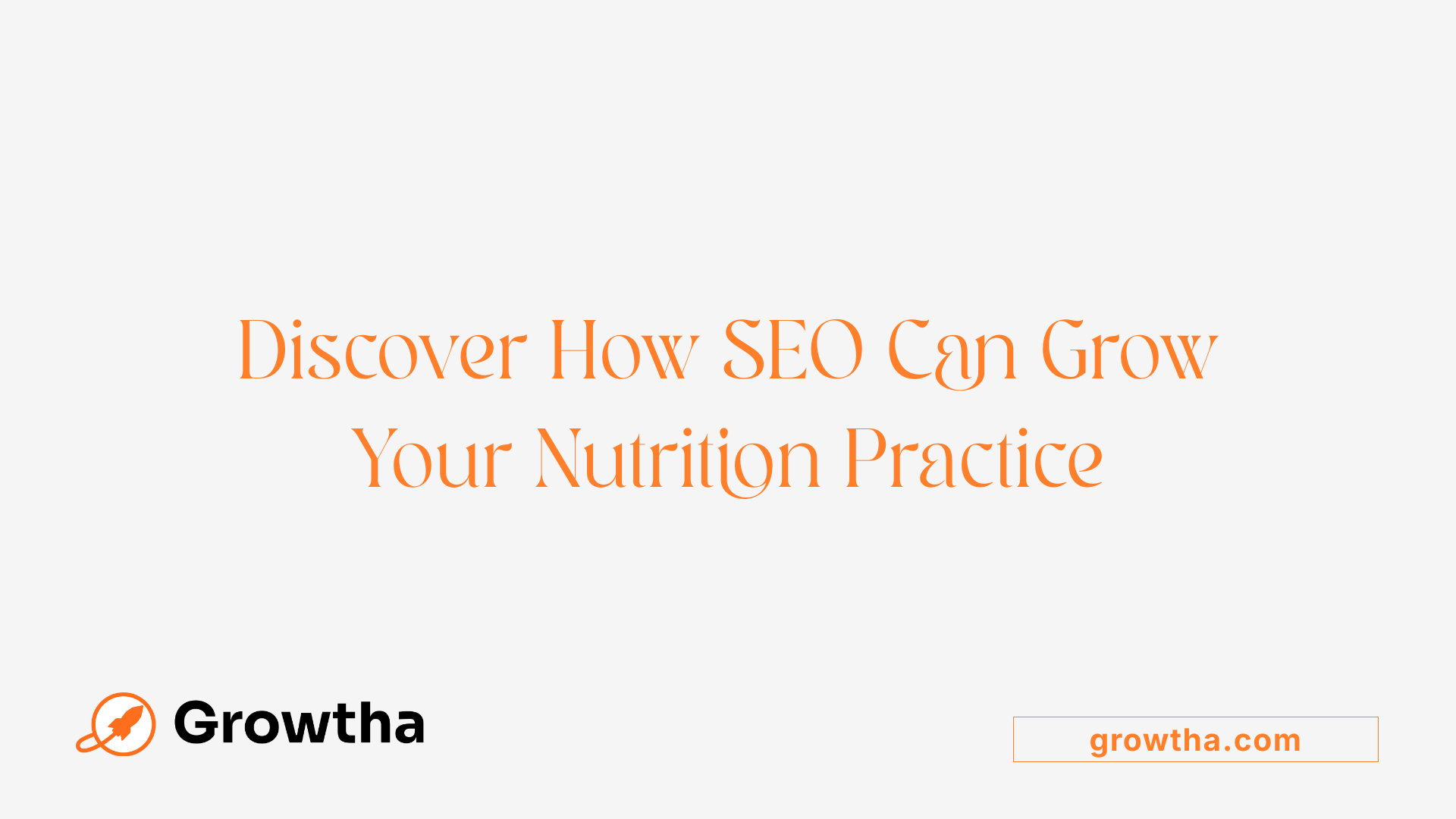SEO for Nutritionists and Dietitians
Enhance Your Practice with Effective SEO Strategies


SEO for Nutritionists and Dietitians
Unlocking the Power of SEO for Nutrition Professionals
In today’s digital age, establishing a strong online presence is vital for nutritionists and dietitians seeking to attract new clients and expand their practice. Search Engine Optimization (SEO) is the cornerstone of this strategy, enabling practitioners to appear prominently in search results where potential clients are searching for nutrition services. This article explores comprehensive SEO fundamentals tailored specifically for nutrition professionals, providing actionable insights to optimize websites, create compelling content, and stay ahead of emerging trends.
Fundamentals of SEO for Nutrition Professionals

What are the fundamentals of SEO for nutrition professionals?
For nutritionists and dietitians, mastering SEO involves applying several core strategies to improve their online visibility. First, comprehensive keyword research is essential. Using tools like WordStream’s Keyword Planner and Google Keyword Planner helps identify relevant keywords, from broad terms like 'nutritionist near me' to long-tail phrases such as 'nutritional counseling for weight loss.' Incorporating these keywords naturally into website content ensures that potential clients find your page when searching for specific services.
Creating high-quality, in-depth content is another pillar of effective SEO. Well-researched articles, around 5,000 words, that offer valuable insights and align with Google's E-E-A-T principles (Experience, Expertise, Authority, Trustworthiness) help establish credibility and improve rankings. This includes providing clear, accurate information backed by evidence, which not only attracts visitors but also builds trust.
Optimizing website structure and technical SEO is equally important. This involves structuring pages with descriptive headings and URL slugs, optimizing image alt text with relevant keywords, and internal linking to enhance navigation. Ensuring your site is mobile-friendly, loads quickly, and passes Core Web Vitals improves user experience and search rankings.
Local SEO tactics, such as claiming and updating your Google My Business profile, managing reviews, and including location-specific keywords, help attract nearby clients. Building backlinks from reputable sources and directories increases your site’s authority, further improving your visibility.
To maintain and grow your SEO success, regular monitoring via tools like Google Analytics and Search Console is vital. These insights help you understand what works, identify areas for improvement, and adapt your strategies accordingly. Combining these foundational practices creates a robust SEO presence that can sustainably attract new clients and grow your nutrition practice.
Strategies to Improve Online Visibility for Dietitians and Nutritionists

How can dietitians and nutritionists improve their online visibility?
Enhancing online presence is crucial for dietitians and nutritionists aiming to attract more clients. One of the primary strategies involves optimizing website content with relevant keywords that potential clients search for, such as 'nutritionist near me' or 'dietitian for weight loss'. Incorporating these keywords naturally into titles, headings, and throughout the content helps improve search engine rankings.
Improving website performance is equally important. Ensuring fast load times, mobile responsiveness, and secure connections (HTTPS) enhances the user experience and aligns with search engine ranking factors. Regularly fixing broken links and optimizing images for faster page speed can also make a significant difference.
Local SEO techniques are particularly effective for attracting nearby clients. This includes claiming and updating your Google My Business profile, maintaining consistent name, address, and phone number (NAP) information across directories, and encouraging satisfied clients to leave positive reviews. Location-specific keywords integrated into website content and service pages help target customers searching within your geographic area.
Creating high-quality, authoritative content establishes expertise and drives organic traffic. Detailed blog posts about specific nutrition topics, FAQs addressing common client questions, and comprehensive service pages enhance relevance in search results. Consistently publishing such content positions your practice as a trustworthy source.
Social media integration further supports visibility. Sharing blog posts, success stories, nutrition tips, and videos on platforms like Instagram, Facebook, and LinkedIn increases brand awareness and website visits. While social media signals don't directly impact SEO rankings, increased online engagement helps establish a credible online presence.
Monitoring your SEO efforts with analytics tools such as Google Analytics and Search Console provides insights into website performance, user behavior, and keyword effectiveness. These data points guide ongoing adjustments to your strategies, ensuring sustained growth and improved search rankings.
By combining these approaches—keyword optimization, technical website improvements, local SEO, valuable content creation, active social media use, and performance tracking—dietitians and nutritionists can significantly enhance their online visibility and attract targeted client traffic.
Effective Website and Content Optimization Techniques in Nutrition
 Optimizing a nutritionist's website for search engines involves various strategic actions aimed at increasing visibility and attracting potential clients. One of the foundational steps is conducting comprehensive keyword research. Using tools like WordStream’s free keyword tool, nutrition professionals can identify relevant search terms, including long-tail keywords such as "nutritionist near me" or "dietitian for weight loss." These keywords should be seamlessly integrated into website elements like headings, URLs, meta descriptions, and image alt texts to align with what potential clients are searching for.
Optimizing a nutritionist's website for search engines involves various strategic actions aimed at increasing visibility and attracting potential clients. One of the foundational steps is conducting comprehensive keyword research. Using tools like WordStream’s free keyword tool, nutrition professionals can identify relevant search terms, including long-tail keywords such as "nutritionist near me" or "dietitian for weight loss." These keywords should be seamlessly integrated into website elements like headings, URLs, meta descriptions, and image alt texts to align with what potential clients are searching for.
In addition to keyword integration, focusing on on-page SEO elements significantly enhances search rankings. This includes optimizing meta descriptions, title tags, header tags, and internal links. Ensuring all webpage content is engaging, well-structured, and loaded with relevant keywords helps improve relevance while maintaining readability for users.
Technical SEO is equally important. Nutrition websites should prioritize site speed, mobile responsiveness, and security (using HTTPS). Tools like Google Search Console can help identify issues and track performance metrics like Core Web Vitals, which Google considers for rankings. Making technical improvements ensures fast, user-friendly websites that meet the standards of search engines.
Creating long-form, high-quality content is crucial for authority. In-the-depth articles, approx. 5,000 words, demonstrate expertise, build credibility, and enhance SEO performance. Such content should be credible, accurate, and based on evidence, helping to establish trust and resonate with Google’s E-E-A-T principles—Experience, Expertise, Authority, and Trustworthiness.
Finally, off-page strategies, including earning backlinks from reputable sites, gathering positive reviews, and listing on reputable directories, improve domain authority. Combining on-page optimizations with off-page efforts results in a comprehensive SEO strategy that boosts organic traffic. Monitoring these efforts with tools like Google Analytics and Search Console allows continuous refinement, ensuring content remains aligned with search intent and evolving SEO standards.
For nutritionists aiming to improve their online presence, implementing these landing techniques can lead to sustainable growth in visibility and client intake through search engines.
Incorporating Nutrition Topics into SEO and Content Strategies

How should nutrition topics be incorporated into keyword research and content creation?
Effective SEO starts with understanding what potential clients are searching for online. Nutritionists should begin by using keyword research tools like Google Keyword Planner and WordStream to identify relevant keywords and long-tail phrases such as 'nutritionist near me' or 'dietitian for weight loss.' These tools help uncover high-volume search terms that resonate with your target audience.
Once you have a list of relevant keywords, develop high-quality, in-depth content that thoroughly covers common nutrition questions and topics. Creating comprehensive articles, ideally around 5,000 words, allows you to provide valuable information that answers client needs while improving search engine rankings.
Your content should be optimized using best practices: include keywords naturally in titles, headings, and throughout the text; optimize meta descriptions; use descriptive alt text for images; and link internally to related topics and externally to reputable sources. Enhancing readability with clear structure and engaging language improves user experience.
Ensuring your website is technically sound is equally important. Fast loading speeds, mobile responsiveness, and a secure HTTPS connection contribute to better rankings and user trust.
Demonstrating your expertise, experience, authority, and trustworthiness (E-E-A-T) is vital, especially for health-related content. This means citing credible sources, showcasing qualifications, and publishing evidence-based insights.
Finally, continuously measure your content’s performance using analytics tools such as Google Analytics and Search Console. Monitoring metrics like traffic, bounce rate, and keyword rankings will help you refine your content strategy, ensuring ongoing relevance and higher visibility in search results.
Benefits of SEO for Dietitians and Nutritionists

What are the benefits of SEO for dietitians and nutritionists?
Search Engine Optimization (SEO) provides numerous advantages for dietitians and nutritionists aiming to grow their practice and attract more clients. By optimizing website content with relevant keywords, improving site functionality, and building authority through high-quality information, nutrition professionals can enhance their visibility on search engines.
Effective SEO strategies help them rank higher in search results for terms like 'nutritionist near me' or 'dietitian for weight loss', making it easier for potential clients to find and choose their services. This increased visibility not only boosts inquiries but also elevates the practice’s credibility in the online space.
SEO also supports long-term practice growth by consistently driving targeted, organic traffic to the website. Unlike paid advertising, which stops delivering results once the budget runs out, SEO builds over time, creating a steady flow of prospective clients. Claiming Google Business profiles, creating localized content, and optimizing for local SEO further attract nearby clients, especially in competitive markets.
Beyond immediate benefits, SEO helps establish authority and trust. Producing well-researched, evidence-based content, such as detailed articles or FAQs, positions the practitioner as an expert in their field. This credibility is aligned with Google’s E-E-A-T principles, which prioritize authoritative and trustworthy sources.
Overall, steady SEO investments lead to improved online presence, increased client inquiries, and sustainable practice growth. For nutritionists seeking a cost-effective, long-term marketing strategy, implementing sound SEO practices is essential for attracting qualified traffic and establishing a reputable brand in the digital age.
Elevate Your Practice with Long-Term SEO Success
Implementing effective SEO strategies is essential for nutritionists and dietitians aiming to grow their online presence, attract new clients, and establish authority in the health and nutrition sector. By focusing on comprehensive keyword research, content quality, website performance, and local SEO, professionals can achieve sustainable growth and long-term visibility. Staying abreast of latest trends and continuously optimizing your site will ensure you remain competitive in an increasingly digital marketplace. Remember, SEO is an investment in your practice’s future — patience, consistency, and strategic efforts will yield rewarding results over time.
References
- SEO for Nutritionists - TherapieSEO
- SEO and Content Strategy for Nutritionists - NutriAdmin
- SEO for Dietitians & Nutritionists: How to Get More Clients
- A Guide to SEO for Nutritionists and Dietitians with Stratedia
- SEO for Private Practice Dietitians in 2025 - Jess Creatives
- SEO Marketing for Dietitians and Nutritionists - Jon Lanman
- How to write a SEO nutrition article: for dietitians - Keenoa
- SEO Best Practices for Dietitians to Market Your Services Online







